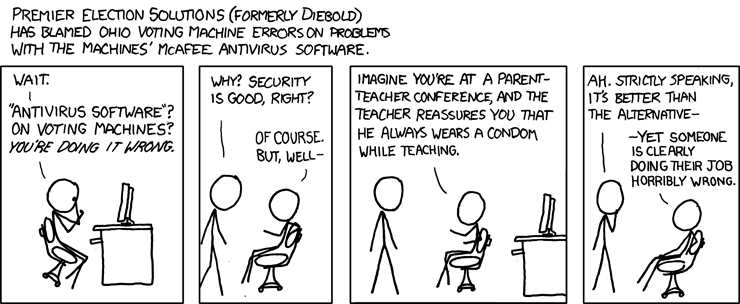Given the extreme consequences we mete out to sexual transgressors1, we must more than ever before reflect on how we know that our outlawed sexualities are innately harmful – that is, damaging by their nature alone, excepting their violent, life-destroying extrinsic consequences. A few main points I would like people to consider:
- The exacerbating effects of the secrecy and isolation necessary in age-disparate relationships merits analysis.
- Psychology has before failed to test assumptions based on social norms. (e.g., homosexuality)
- Mandating the status of victim on people who don’t want it is inhumane.
- Insisting that someone is hurt in an invisible way and might not even know it should be regarded skeptically. It is a claim that is difficult to falsify2 and is therefore pseudoscientific.
- Sacrosanctity isn’t necessarily correctness.3
Today I’m going to comb through a report4 on female teacher sexual transgressors.

Randall Munroe, xkcd: Voting Machines
The November 3rd, 2014 edition of Maclean’s promises on its cover “SEX OFFENDERS NO ONE SUSPECTS: FEMALE TEACHERS.”5 Turn to page 44 and you will find a report by Anne Kingston that assumes the prejudices of our sex-supressing culture and does nothing to question the abominably evil reality that you must be a victim merely because the true believers in the legal system and their pseudoscientific enablers in the bowels of psychology6 say you must be. Okay, maybe I’m a bit cynical, but hear me out. (Or read the vastly shorter letter I wrote to Maclean’s.)
Now, before I get into this:
- I acknowledge that there are cases of despicable manipulation and monopolization that merit a response that may need to include prosecution.
- I also acknowledge that anyone who feels that they have been abused must have gone through severe stress and torment, although it might be at the hands of society and the legal system and not wholly or even necessarily reflecting the nature of the stigmatized activity.
- I’m not suggesting that the silence around coercive, stultifying abuse isn’t worse than the silence around consensual7 activity.8
- And, as I’ll say again in a second, for a teacher to bring the world crashing down on herself and a student and everyone else in the vicinity, is plain nuts.
Large categorical taboos mean that everything gets painted with the same broad brush, and Maclean’s is, consciously or unconsciously, content to maintain our categorical thinking merely by using the term “sex offender”, as it covers everything from consensual sex that happens to be against the law to kids being whipped within an inch of their lives for the sake of producing pornography for violentophiles9.
Kingston’s thesis is simply that “the treatment of female teachers who sexually exploit male students reflects legal and cultural double standards.” It’s borne out – females get probation and time served while males go to the crowbar saloon. But I worry that the way we’ll fix the double standard is by making non-normative females and their lovers as miserable as the non-normative males and their lovers.
Not to mention sex workers! Thank the FSM for sex workers and their advocates on Twitter. Here’s @SugarKovalczyk: “Some of y’all should reexamine your beliefs in a historic & global sense while recognizing how late 20th century hysteria has shaped you so far.” I also recommend this essay by Mistress Matisse on the “End Demand” Campaign. Quote: “End Demand activists are quick to say ‘prostitution is not a victimless crime.’ Not while they’re around, it won’t be.” ↩
Meaning that it’s hard to compare the idea to reality – this comparing is the perspiratory part of science. Paul Lutus’ essay “Building Science” begins by explaining falsifiability. ↩
As David Dunning writes in Pacific Standard: “Some of our most stubborn misbeliefs arise not from primitive childlike intuitions or careless category errors, but from the very values and philosophies that define who we are as individuals. Each of us possesses certain foundational beliefs—narratives about the self, ideas about the social order—that essentially cannot be violated: To contradict them would call into question our very self-worth. As such, these views demand fealty from other opinions. And any information that we glean from the world is amended, distorted, diminished, or forgotten in order to make sure that these sacrosanct beliefs remain whole and unharmed.” – from “We Are All Confident Idiots”
For an extended take on this in the context of American politics:
Jonathan Haidt – “Why So Many Americans Don’t Want Social Justice and Don’t Trust Scientists” (2013 Boyarsky Lecture in Law, Medicine & Ethics, Duke University) ↩Anne Kingston, Maclean’s – “Female teachers: The sex offenders no one suspects” ↩
Paul Lutus, Arachnoid.com – “Is Psychology a Science?” ↩
“Consent” is a legally-blinkered term, not a humanistic one. It suggests that you’re agreeing to something that is against your interest by default. It belongs in draconian places like employment law – you consent to have no privacy, you consent to being able to be fired at will.
But this is the term we have, so I assert that consent that is not legally recognized can yet be consent on the principle of mutual self-determination (infinitely more important, provided you’re not getting together to plan a shooting spree), but I’d rather just avoid the word, not to mention the simplistic arguments that follow that rest directly on the socio-legal recognition of consent rather than addressing the actual nature of our sexuality. (“I won’t debate this with you because you refuse to recognize that an n-year old can’t consent.”)
I also reject the idea that sexuality is as necessarily fraught as getting a mortgage. Oh, sure, it frequently ends up being a great big mess, but I think most of the problems with it are extrinsic – the dictates of our nature perpetually clash with the established social order, one that forces us to live in ignorance.
As a thought experiment, imagine if the sexual standard for consent applied in other areas. Let’s say food. You could argue that children shouldn’t be fed because they don’t understand exactly what is happening and what they’re agreeing to do. Consent is impossible. Being fed without consent is abuse.
I think even most pedophiles would be against coercion, but as long as people define a sufficiently high bar for legal consent in this single area, it’ll never be cleared, and we’ll have more food for the prison-psychiatric-industrial complex.
As a pragmatic friend says to me, “It is ultimately silly to come up with black and white rules about who can and cannot consent that are based on thresholds whose precise positions are arbitrary. But then, black and white rules are efficient for managing large populations.” Well, there’s a certain dehumanization in insisting that a large population be wholly united on all things and wholly managed the same way. For a counter-vision, read Scott Alexander’s “Archipelago and Atomic Communitarianism”.
I’ve been an ass about word choices before, and I probably will be again. I know I despise being told what words I can and can’t use. Our words reflect our identity. Rather than circulate lists of words, we should probably just reflect more often on the words we use – how we steer with our choices and are in turn steered by the choices of others.
Lezlie Lowe, Chronicle-Herald – “Defusing the landmines of language”
↩I think the silence is related, embedded in the same morass of sex-negative shame. But same silence or not, I think the silence is corrosive to the better angels of both interests. Think of this as you would a commentary about the danger of Islamophobia the day after 9/11. ↩
Of course, if you like looking at young people without their clothes on, you’re every single bit as depraved as the people who beat and torture children and who may or may not record it. Because reasons. ↩
